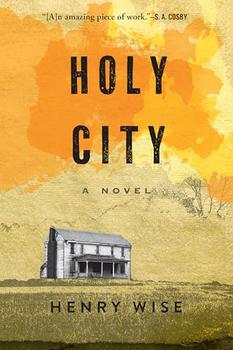Page 1 of 1
There is 1 reader review for Holy City
Write your own review!
 Cloggie Downunder
literary crime fiction at its best
Cloggie Downunder
literary crime fiction at its best
4.5
“People around here seemed to live in a cloud of defeat, self-wrought and inherited. Whites had the lost cause; Blacks had slavery.”
Holy City is the first novel by American poet, photographer and author, Henry Wise. After a decade in Virginia’s Holy City, Richmond, Will Seems returns to his hometown of Dawn and works as a Deputy with the Euphoria County Sheriff’s Department. He doesn’t share his reason for returning although some make educated guesses.
When he spots a fire at the Turkey Creek home of former high school football star, Tom Janders, he risks his life to drag Tom out of the burning house. When Sheriff Jefferson Mills arrives, he immediately rules it murder: Tom has been stabbed in the back. Sawmill worker, Zeke Hathom is spotted fleeing the scene, and Will reluctantly arrests him. The Sheriff has soon charged Zeke with Tom’s murder, but neither Will, nor the victim’s mother, nor many of the town folk, are convinced that Zeke could kill his neighbour.
Will finds Zeke’s story plausible and, while prints on the murder weapon implicate him, Will feels he owes Zeke and his family, so he decides to properly investigate despite the Sheriff’s lukewarm response. Zeke’s wife, Floressa has no confidence that justice will be served. She engages disgraced Richmond cop, Bennico Watts to solve the murder and exonerate her husband. And she insists that Bennico, a woman who always works alone, teams up with Will.
Will has a problem with the idea too: he’s harbouring a fugitive in his dilapidated old family home. And his opposition to the Sheriff’s attitude threatens his access to information about the case. There’s talk of a cash debt, and some disgruntled gamblers who lost big to Tom on the night he died. Will (and Bennico) are thorough in their enquiries, becoming steadily more certain that Zeke is innocent and someone else deserves their scrutiny.
The astute reader will wonder early on about the Sheriff’s motivation and, while the murderer is revealed to the reader at the halfway mark, the journey to this being generally acknowledged, and the aftermath, definitely keep the pages turning. Readers may appreciate a trigger warning: there are several explicit descriptions of deviant sexual behaviour, and the ambiguous ending may not be to everyone’s liking.
Wise’s characters are complex, and he certainly challenges them with difficult dilemmas. His protagonist is plagued with a long-standing guilt that affects his reasoning. Bennico has Will summed up fairly quickly: “wearing that badge just to carry out a personal vendetta you haven’t had the courage to complete.”
He does give them some wise words: “You have to ask yourself if you really want to solve a problem or if you’ve learned to use it as a crutch. Sometimes, we learn to savor our pain. Ask yourself if this is more about some guilt you feel than it is about bringing them to justice. No act undoes the past” and insightful observations “Things that don’t get said are just as true as those that do.”
He fills his debut novel with gorgeous descriptive prose: “They could hear, beyond the roar of wind through the open windows, the life buzzing and skittering out over the wide openness of the fields, ending in trees and vines thick and tall over the road, the sound of cicadas and other insects ebbing and searing, subsiding again when the land opened up to new fields where tall trees like explosions broke the sky” and “They drove, the sun long gone, the glowing headlights scanning the cowled land for whatever might emerge, the gradual highway undulating in serpentine curves and straightaways where you could see, far ahead, the gleaming road like a blade under the moon” are examples.
Atmospheric, haunting and beautifully written, this is literary crime fiction at its best. More of Henry Wise will be eagerly anticipated.
This unbiased review is from an uncorrected proof copy provided by NetGalley and Grove Atlantic.
